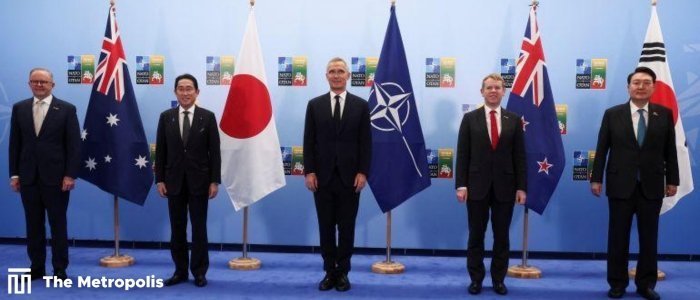Leaders from Asia pose for a group photo with NATO Secretary General Jens Stoltenberg in Vilnius [Kacper Pempel/Reuters]
Metropolis Desk-
Beijing responded strongly to a NATO communiqué that portrayed China as a significant threat to the security and interests of the military alliance.
NATO leaders claimed the People’s Republic of China (PRC) endangered the alliance’s interests, security, and values with its “stated ambitions and coercive policies” in a harsh statement released halfway through their two-day summit in the capital city of Lithuania, Vilnius.
The leaders of the group stated in their 90-point communique that “the PRC employs a broad range of political, economic, and military tools to increase its global footprint and project power while remaining opaque about its strategy, intentions, and military build-up.”
“The PRC targets Allies and undermines Alliance security with its nefarious hybrid and cyber operations, confrontational rhetoric, and misinformation.”
In addition, the NATO statement said that China and Russia were engaged in a “deepening strategic partnership” and “mutually reinforcing attempts to undercut the rules-based international order.” The leaders encouraged China to denounce Russia’s “war of aggression against Ukraine” and take a “constructive” position as one of the five permanent, veto-holding members of the United Nations Security Council.
The Chinese embassy in the European Union denounced the remarks and charged NATO with intentionally misrepresenting China’s viewpoint and working to damage its reputation.
It issued a statement on Tuesday that read, “We firmly oppose and reject this.”
Along with other world leaders, South Korean President Yoon Suk-yeol, Japanese Prime Minister Fumio Kishida, New Zealand Prime Minister Chris Hipkins, and Australian Prime Minister Anthony Albanese will be at the NATO summit amid worries about escalating tension in the region over issues ranging from China to North Korea, which conducted a suspected long-range ballistic missile test on Wednesday.
The four nations were also invited to the previous year’s NATO meeting in Madrid because they have supported Ukraine through sanctions and military assistance. In May, after the alliance announced it was setting up its first office in Asia in Tokyo, Kishida emphasized that Japan had no aspirations to join NATO.
Beijing opposes NATO’s “eastward movement into the Asia-Pacific region,” according to the Chinese mission, and it issued a stern warning: “Any act that jeopardizes China’s legitimate rights and interests will be met with a resolute response.”
NATO was criticized by China’s state media for its outreach to the region’s democracies. The tabloid Global Times published an editorial accusing NATO of being “Washington’s axe, spears, and shovels” and the “source of war” everywhere it goes.
The editorial stated that the majority of Asian nations “not only do not welcome NATO but also see it as a terrible monster that should be avoided at all costs,” and demanded that NATO immediately withdraw the “black hand” it had extended toward the Asia-Pacific region.
The Strategic Concept, which the organization presented last year and which was the first time the alliance had mentioned the concerns posed by China’s goals and practices, serves as the foundation for the NATO proclamation that was made on Tuesday. It stated that the Asia Pacific was “important for NATO, given that developments in that region can directly affect Euro-Atlantic security”.
Source- Al Jazeera



